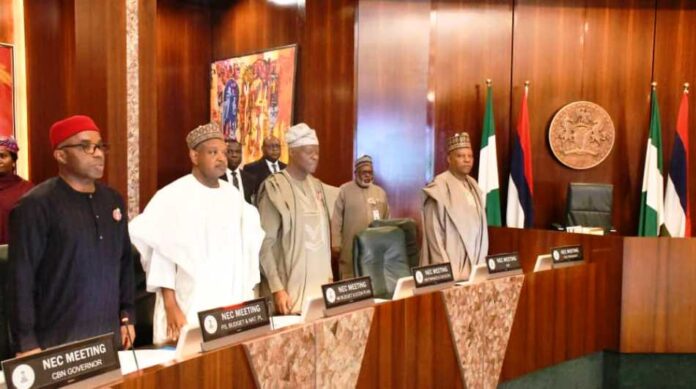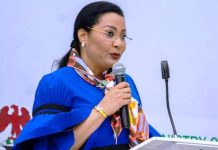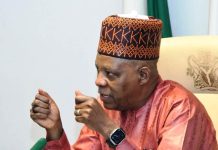…………Economic seeds we’ve sown are beginning to bear fruits, says VP Shettima.
The National Economic Council (NEC) has urged state governments to key into the programmes of the Presidential Food Systems Coordinating Unit (PFSCU) in the bid to address the challenges militating against food security and their underlying causes.
This is just as Vice President Kashim Shettima has said the economic seeds sown by the federal government by way of reforms and interventions in 2024 are already beginning to bear fruits.
NEC took the decision on Thursday during its 147th meeting chaired by the Vice President at the Presidential Villa, Abuja.
In a presentation to council, the Technical Assistant to the President on Agriculture (Office of the Vice President), Marion Moon, and coordinator of the Presidential Food Systems Coordinating Unit (PFSCU), highlighted the strategy proposed by the unit to collaborate with sub-nationals in addressing food insecurity and unlocking Nigeria’s agricultural potentials across the country.
She said the PFSCU priorities, especially in agri-business, will enhance delivery mechanisms and expedite action in the attainments of targets enshrined in the Tinubu administration’s Renewed Hope Agenda and the various aspirations by the respective state governments.
In its resolution, NEC “commended the presentation by the coordinator of the unit and urged state governments to key into the initiative,” even as it “requested the unit to prepare key achievements of its unit at the next meeting of the council”.
NEC also approved the request by the Revenue Mobilization, Allocation and Fiscal Commission (RMAFC) to seek a National Assembly amendment to its subsisting Act and to provide an alternative funding source for the Commission.
Council’s approval followed an earlier presentation by RMAFC seeking Council’s approval of RMAFC’s proposed Bill to the National Assembly to amend its subsisting Act, and approval of 0.05% of non-oil federation revenue as an alternative funding source for the Commission.
Earlier, Vice President Shettima said the economic seeds sown by the federal government by way of reforms and interventions in 2024 are already beginning to bear fruits.
The VP urged members of the Council to brace up for the new year, taking into cognizance the extent to which the programmes, projects, and policies executed this year have influenced the course of the nation’s economy.
Speaking on Thursday during the 147th NEC meeting at the Presidential Villa, Abuja, Senator Shettima noted that it was not just the final meeting of Council for the year but also a session to assess progress made so far in advancing the aspirations of the Nigerian people, and whether the actions and decisions taken have justly prioritised the collective good over individual interests.
He said, “Difficult decisions have been taken to redirect the course of our national economy, and the results are beginning to show. The recent report of a 3.46% GDP growth in the third quarter of 2024 is a reassuring sign of the harvests ahead. This growth reflects not just numbers, but the collective efforts and sacrifices made by all stakeholders in this room.
“Our agenda today includes a presentation on the current state of the economy by the World Bank. This is a timely discussion as we approach what promises to be our season of harvest. The economic seeds we have sown throughout this year, through reforms and interventions, are beginning to bear fruit”.
VP Shettima observed that the NEC meeting which is always held at the council chamber of the Presidential Villa has been an avenue that provides diverse viewpoints, including dissenting and contrarian voices, noting that it attest to the democratic disposition of President Bola Ahmed Tinubu.
He stated: “This is a testament to the strength of the democratic traditions upon which this Council is built, traditions upheld and championed by His Excellency, President Bola Ahmed Tinubu, GCFR. A democrat in every sense, he has stood with you, recognised your voices, and ensured that this council remains a centre of collaborative governance.
“As members of the executive branch, we understand that our role is but one part of a larger democratic framework. This system of governance is defined by checks and balances; it ensures that every decision reflects not just the will of a few, but the interests of the many. Yet, I assure you that no recommendation, suggestion, or proposal put forward in this chamber has been taken for granted”.
The Vice President also described the World Bank’s HOPE Project, which focuses on Human Capital Opportunities for Prosperity and Equity, as a significant opportunity for Nigeria.
“This initiative promises to strengthen our basic education and primary healthcare systems, ensuring that we expand our human capital indices in ways that create lasting impacts.
“Through targeted strategies, we can address long-standing inequalities and position our workforce to compete in a rapidly evolving global economy,” he further noted.
Other highlights of the NEC meeting include:
UPDATE ON ACCOUNT BALANCES AS AT DECEMBER 2024
Excess Crude Account – $473,754.57
Stabilization Account – N33,727,1919, 212.94
Natural Resources Account – N28,275,747,874.93
UPDATE ON NEC ADHOC COMMITTEE ON FLOOD, EROSION, DROUGHT AND DESERTIFICATION BY KOGI STATE GOVERNOR USMAN ODODO
The chairman of the NEC Ad-hoc Committee and Governor of Kogi State, Usman Ododo gave an update report on the committee’s activities and noted the implementation of some of its recommendations, especially the provision of financial support to States and disbursement of funds to line ministries and agencies of government to address flood and related disasters across the country.
He prayed Council to approve the winding down of the committee’s activities and transfer of its duties to the Taskforce on Flood, Erosion, Drought and Desertification.
Resolution:
Council noted the prayers of the committee and commended the chairman and members for discharging their tasks dutifully and approved its recommendations for the disbursement of the balance of funds approved for MDAs for flood mitigation and related activities.
UPDATE ON STATE POLICE
Update on submission of establishment of State Police was presented to Council thus:
35 states have submitted, namely; Abia, Adamawa, Akwaibom, Anambra, Bauchi, Bayela, Benue, Borno Cross river, Delta, Ebonyi, Edo, Ekiti, Enugu, Gombe, Imo, Jigawa, Kaduna, Katsina, Kano, Kebbi, Kogi, Kwara, Lagos, Nassarawa, Niger, Ogun, Osun, Oyo, Ondo, Plateau, Rivers, Sokoto, Taraba, Yobe, Zamfara, FCT is yet to submit.
The final report will be submitted at the next Council Meeting
Resolution:
Council stood down the issue of State Police till January 2025.
There is for stakeholder engagement to further finetune the submission so as to make informed judgement towards establishment of state Police
The Permanent Secretary to continue further engagement with stakeholders and draw a roadmap for robust framework.
UPDATE ON THE REQUEST BY REVENUE MOBILIZATION, ALLOCATION AND FISCAL COMMISSION (RMAFC) TO THE NATIONAL ECONOMIC COUNCIL (NEC)
Council was called to note that the purpose of the update is to apprise it of the outcome of the meeting between the National Economic Council Secretariat, led by the Secretary to Council, and Management of the Revenue Mobilization, Allocation and Fiscal Commission, led by the Executive Chairman.
Council may recall the presentation by the Chairman, Revenue Mobilization, Allocation and Fiscal Commission (RMAFC) at the 146th (8th in 2024) National Economic Council (NEC) meeting held 21st November, 2024 seeking Council’s approval of RMAFC’s proposed Bill to the National Assembly to amend its subsisting Act, and approval of 0.75% non-oil federation revenue as an alternative funding source for the Commission, noting that the proposed alternative source of funding was intended to replace the Commission’s envelope budgetary system under the Appropriation Act, which you opined was grossly inadequate for the Commission’s operational needs.
Findings:
Based on the outcome of the meeting and review of relevant documents, the findings/justifications are as follows:
Monitoring, Reconciliation, and Recovery of Revenue Accruals
Institutionalizing Economic Diversification at Federal, State and Local Government Levels:
Monitoring, Reconciliation, and Recovery of Revenue Accruals, among others.
Prayers/Recommendation:
In view of the above and considering the approval of the Federal Ministry of Justice in a letter dated 27th August, 2024 granting the Revenue Mobilization, Allocation and Fiscal Commission an approval to transmit a draft Bill to the National Assembly to repeal its Law Council is invited to consider and approve the following prayers:
I. That the RMAFC should forward the draft Bill to the National Assembly for consideration and passage into Law; and
II. That the RMAFC be allowed to access a total of 0.05% non-oil federation revenue as an alternative funding source in order to effectively implement its mandates.
Resolution:
Council noted the presentation by RMAFC and acknowledged the need for improved funding of the commission given its importance to the economy.
Council approved the recommendation for improved funding for RMAFC and approved that the commission be funded with 0.05% non-oil federation revenue based on the proposed tax reforms and subjected to further scrutiny by the National Assembly.
PRESENTATION ON ESTABLISHMENT AND RE-ADOPTION OF HISTORIC SITES TO CREATIVE VILLAGES (RENEWED HOPE CREATIVE VILLAGE) BY MINISTRY OF ARTS, CULTURE, TOURISM AND CREATIVE ECONOMY
As part of this Initiative, some of these historic sites will be re-adapted into a creative village, (Renewed Hope Creative Village) and new ones will be established as where necessary through a transformative process that blends cultural preservation with innovation.
This involves repurposing these old spaces to create vibrant hubs for artists, entrepreneurs, and communities, all while maintaining the historical integrity of the site. By combining a respect for history with modern creativity and functionality, a historic site can become a thriving creative village that honours its past while fostering innovation and community engagement.
JUSTIFICATION FOR ECONOMIC CONTRIBUTION:
Culture as a major catalyst for economic growth, boosting state revenues and national GDP, job creation and income generation, cultural immersion, year-round events, education and excursions, tourism events, education and excursions, tourism revenue, etc
Prayers:
● Identify key areas of interest
● Logistical support for the courtesy visits to all the states of the federation.
● Execution of MOU
● Implementation
Resolution:
Council noted and commended the effort of the ministry and urged improved synergy between the subnationals and the federal government in the development and management of the cultural creative sites.
Council also requested the Minister of Budget and Economic Planning to liaise with his counterpart in the Ministry of Arts, Culture, Tourism and Creative Economy with the view to increasing the ministry’s budgetary allocation to enable it to carry out its mandate effectively.
PRESENTATION ON WORLD BANK COLLABORATION ON HUMAN CAPITAL OPPORTUNITY FOR PROSPERITY AND EQUALITY (HOPE) PROJECT
Council was called to note that the HOPE-SOP provides an opportunity to boost human capital by tackling both upstream and downstream challenges. The presentation focused on addressing governance and service delivery constraints in basic education and primary health care, among others.
WHAT OUTCOMES WILL HOPE-SOP BRING?
● Enhance allocation, utilization and transparency of federal and state funds at facility levels for health and basic education
● Improve focus on foundational service constraints at facilities (ANC-4, DPT3, mCPR, use of technology)
● Improve foundational literacy & numeracy through structured pedagogy programs to reduce learning poverty (currently at 80%)
● Close the staffing gap by hiring and deploying qualified teachers and priority health workers
● Strengthen compact between FGN, States and LGAs on health and basic education expectation on outcomes
● Increased access to basic education and primary healthcare services at facility level through community-based management approaches
PROGRESS MADE SO FAR, NEXT STEPS
● World Bank approved HOPE-GOV and HOPE-PHC in September 2024
● HOPE-EDU to be approved in March 2025
● HOPE-GOV and HOPE-PHC: National Program Offices almost fully set up.
● Expression of Interest (EOI) letter is a pre-requisite for program participation – a few states have submitted EOIs.
● Interested States need to submit theirs EOIs to FMoF, with copy to sectoral Ministries and World Bank
● Interested States need to ensure programme Eligibility Criteria are met, need to make themselves Implementation Ready, Set up steering and technical committees.
Resolution:
Council noted the importance of the presentation on human capital development, noting that the programmes under HOPE initiative are result driven and would be beneficial to all sub-nationals given the quantum of the challenges across the country.
The Vice President noted that the programme is a golden opportunity for states to reposition healthcare delivery and the education sector in the various domains and urged all state governments to key in and nominate focal persons that will assist in driving the programmes in their areas.
Signed
Stanley Nkwocha
Senior Special Assistant to The President on Media & Communications
(Office of The Vice President)






